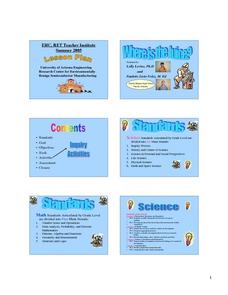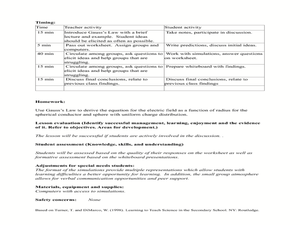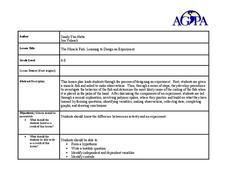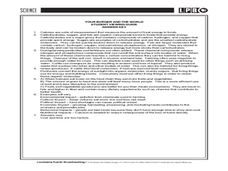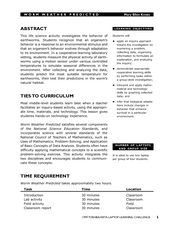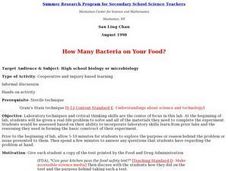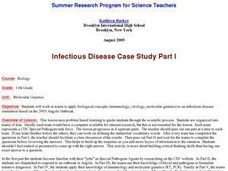Curated OER
Marine Biology Field Trips
Students visit a Marine Biology study area 2-3 times and write a report after the last visit. They participate in the Marine Biology field trips working with lab partners. They complete data sheets to write their primitive environmental...
Curated OER
Animal Organs and the Study of Reproduction, Embryology and Cancer
Students examine organs from dogs and cats to study reproduction, embryology, and the identification of cancer. They record their observations at both the gross and microscopic levels. They present their information to the class.
Curated OER
Where Is The Juice?
Students are introduced to the component's of Ohm's Law. In groups, they practice their problem solving skills by reviewing problems solved earlier. They participate in activities that help them gather information on the importance of...
Curated OER
What Color is the Ocean?
Students view satellite pictures of the ocean, and discuss the presence of phytoplankton and the colors of the ocean. Students compare/contrast ocean satellite images with maps and globes, then color world maps to replicate the satellite...
Curated OER
Gauss' Law
Learners derive the equation of Gauss's law. In this physics instructional activity, students investigate the factors affecting the strength of the electric field. They perform simulation on Gauss's law.
Curated OER
Reading the River - Biological Classification
Youngsters create a list of grocery store items and then work together to categorize them as if they were setting up the shelves of the market. Then they are given a box of miscellaneous objects to practice categorizing. With these two...
Curated OER
Rock Cycle Activity
A few of the components of this lesson are not possible to carry out because the rock cycle diagram and challenge handouts are not included. Hopefully, you already have your own rock cycle diagram or worksheet to use as a concept...
Curated OER
The Miracle Fish: Learning to Design an Experiment
Learners develop procedures to explore the behavior of fish. In this scientific experiment lesson students from a hypothesis, write a question, identify different variables and controls in their experiment.
Curated OER
Exploring Big Bang Evidence
Ninth graders study the Big Bang theory. In this big bang theory lesson students research the Internet and complete several activities and create a presentation.
Curated OER
Opposites Attract
Pupils demonstrate the attraction of small pieces of paper to a charged plastic rod and conduct experiment with other objects to determine whether they can hold a charge. They then use online applets to apply their experiments to...
Curated OER
Fast Food: You Can Choose!
Learners research the nutritional value of fast food. They assess which fast foods are best and worst to eat. They organize their data into tables and graphs and explain their findings to other students.
Curated OER
Building a Pill Bug Palace
Students make "pets" of isopods (potato bugs) to determine their preferred environment and food sources. They record their results on a bar graph and in a scientific report.
Curated OER
Worm Weather Predicted
Students examine worm habitats. In this animal habitats lesson, students participate in a lab activity that requires them to explore the adaptations that earthworms make to their environment.
Curated OER
Ohm's Law
Students explore Ohm's Law. Following given instructions, students build a physical model of a conductor. They observe a relationship between the current, voltage and resistance in a conductor. After experiments, students explain the...
Curated OER
How Many Bacteria on Your Food?
Students discuss and conduct a food safety experiment which looks at bacteria and food poisoning. They swab the other area of some food and grow bacteria in an agar plate.
Curated OER
Sorting Buttons
Students study sorting. In this classification lesson, students sort buttons into groups based on a common characteristic and draw two pictures illustrating the different groups.
Curated OER
Inquiring Minds Want To Know
Eighth graders conduct a scientific experiment that help them explain the concept of nature versus nurture.
Curated OER
Infectious Disease Case Study Part I
Eleventh graders work together to complete a simulation on infectious diseases. They determine which concepts affect a disease more. They complete discussion questions as well.
Curated OER
Don't Flip Out Over the Metric System
Students identify the most appropriate metric prefix to use. They describe the usefulness of a system based on tens. Students compare the metric system to the American system of measurement. They develop a metric flip book to use a...
Curated OER
Bats
Students hypothesize and model how the bones in a bat wing are made up. In this exploratory activity students test their hypothesis, develop questions about bat parts and watch a video on bats.
Curated OER
Space
First graders examine space in this unit of lessons. They create a KWL chart and write in their journals about space. They also examine the phases of the moon and identify the constellations.
Curated OER
Discover the World of Machines
Pupils participate in a project which incorporates science with reading, writing, social studies, and technology. Through several activities over a 15 day period, they explore the computer, digital camera, computer software programs and...
Curated OER
A "Real" Picuture of a Scientist
Students share their own stereotypes when they talk about scientists. In groups, they draw a picture of a scientist where they are working and the tools they most commonly used. Using the internet, they discover how archeolgists use the...
Curated OER
Archaeology is ...
Students demonstrate the importance of context for learning about ancient people. They assess the importance of preservation of cultural resources. They exchange papers with a student in class. The students with the paper are responsible...
Other popular searches
- Inquiry Based Science Lessons
- Inquiry Based Science Water
- Science Inquiry Based
- Inquiry Based Science Lessons
- Inquiry Based Science Sose
- Inquiry Based Science Souse
- Science Inquiry Based Learning




